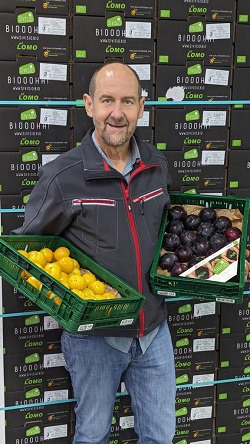"We received the first plums from Spain in mid-June. Usually, the first batches come to us from the regions of Murcia and Valencia, followed by plums from the region of Extremadura, which is the main source for our plums," Christian Kaufmann (right), managing director of Naturkost Schramm Import-Export, tells us. "The plum trees require less water than crops such as lettuces, onions and other products grown outdoors. Extremadura also has water problems, but not as massive as Murcia or Andalusia." Extremadura draws its main water from northern Spain or northern Portugal, he said.
first plums from Spain in mid-June. Usually, the first batches come to us from the regions of Murcia and Valencia, followed by plums from the region of Extremadura, which is the main source for our plums," Christian Kaufmann (right), managing director of Naturkost Schramm Import-Export, tells us. "The plum trees require less water than crops such as lettuces, onions and other products grown outdoors. Extremadura also has water problems, but not as massive as Murcia or Andalusia." Extremadura draws its main water from northern Spain or northern Portugal, he said.
Great quality, stable volumes
In general, the quality of stone fruit this season has been very good, Kaufmann says: "In the spring, there were some night frosts and minimal crop losses, but no rainfall. Overall, it was very dry in the spring, which is why no fungal diseases were able to develop. Supply levels are comparable to last year." The advantage of plums over other stone fruits, such as nectarines and peaches, he said, is that they can be stored longer. "Peaches can be stored for two to three weeks, while plums, again, can be stored in cold storage for up to a month and a half."
Interest in red or black plums is higher than for yellow, he said. "We sell about 70 percent red/black plums and 30 percent yellow plums. The price for the plums is about 13 percent higher than last year." Furthermore, Kaufmann notes that interest in larger calibers has increased, as well as taste is key. "Some varieties that are barely marketable have been sorted out by growers in Spain. People in Spain are now moving toward growing only certain varieties that also have a suitable flavor." The product becomes expensive, however, the producer does not necessarily get more money, as he can only pass on a small percentage.
Organic industry sees another upswing
On average, he said, prices in the organic industry are up about ten percent compared to 2022. "The period up to Easter was very challenging. Since then, however, the industry has turned positive again and is stabilizing to some extent. We saw very good sales in June in particular." Kaufmann also expects July to be a good month. In winter, there was still the situation that the prices of conventional goods were partly higher than for organic products. Because of this, some retailers would have sold their organic goods as conventional goods as well. "We are not out of the organic crisis yet, but we can breathe again."
For more information: Christian Kaufmann
Christian Kaufmann
Naturkost Schramm Import-Export GmbH
Industriestraße 5 a
D-77767 Appenweier
Tel. +49 (0) 7805 9668-20
Fax +49 (0) 7805 9668-70
[email protected]
www.schramm-naturkost.com










